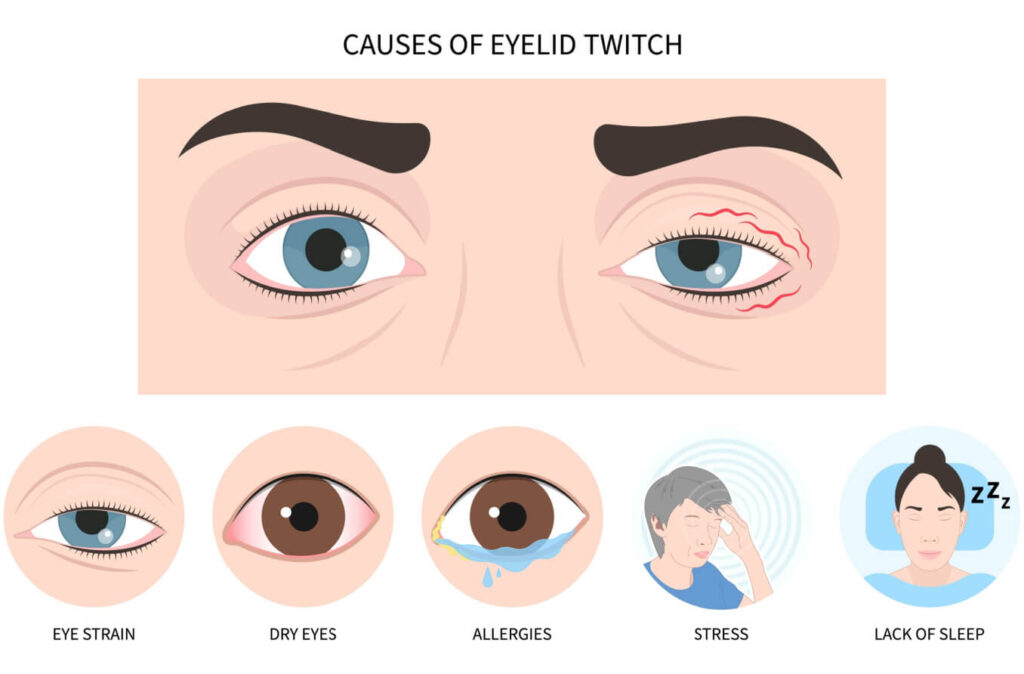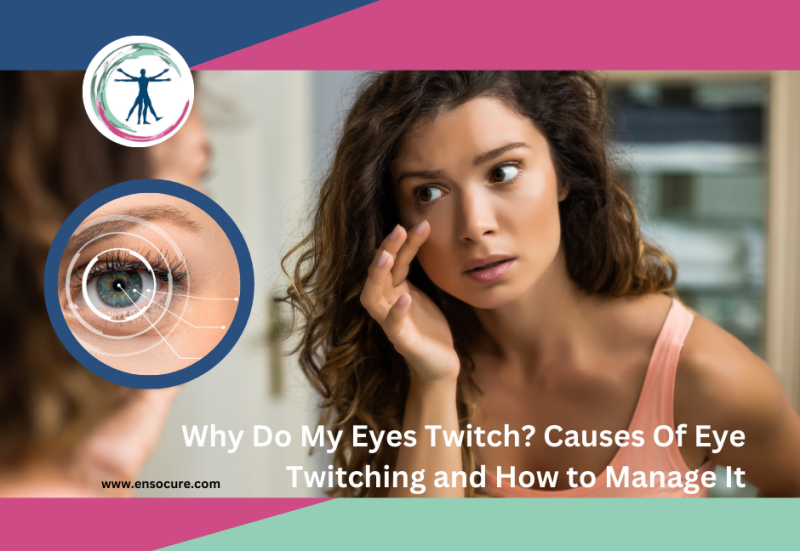Have you ever experienced that annoying sensation of your eyelid twitching involuntarily? It’s a common occurrence that can happen to anyone at any time. While it might seem harmless, persistent eye twitching can be bothersome and even indicate underlying health issues. Here’s a detailed physiological explanation of eye twitching.
What is Eye Twitching
Eye twitching, medically known as myokymia, when you’re tired is often due to fatigue or stress. These contractions typically occur in the upper eyelid but can also affect the lower eyelid. The twitching sensation may vary in intensity and duration, ranging from a barely noticeable flutter to a more pronounced spasm that is visible and distracting. Many people might experience an occasional eye twitch, especially when tired or due to excess caffeine consumption. Frequent eye twitching is uncommon although it might be more prominent in middle-aged and older women
Symptoms of Eye Twitching

The main symptom of eye twitching is the involuntary twitching or spasms of the eyelid muscles. Eyelid twitches can vary in severity and frequency. Some people might have frequent eyelid twitches while others will experience them less. Sometimes an eye twitch might last a few days or longer and then go away. In some people, eye twitching can last for a longer period, but symptoms don’t usually return as a frequent occurrence. Usually, only the upper lid twitches. Probably both of your eyes will twitch, but sometimes only one eye shows symptoms. Your eyelid might just shut partly, or it might close all the way. However, in some cases, individuals may also experience accompanying symptoms, including:
- Sensation of fluttering or pulsating in the eyelid
- Increased sensitivity to light
- Mild discomfort or irritation in the affected eye
- Temporary blurred vision during the twitching episode
- Fatigue or strain in the eyes
Causes of Eye twitching
Eye twitches can be due to several causes, but the most common causes as the experts feel are:
Neuromuscular Control: Your eyelids are controlled by muscles, which are in turn regulated by nerves. The main muscle responsible for closing the eyelid is the orbicularis oculi, controlled by the facial nerve. When you’re tired, the neuromuscular control might become erratic or overly sensitive, leading to involuntary twitching.
Fatigue: When you’re tired, the muscles and nerves around your eyes may become overworked or strained. This fatigue can lead to misfiring of the nerves or muscle fibers, causing the eyelid to twitch.
Stress and Neurotransmitters: Stress, often associated with tiredness, can lead to an imbalance of neurotransmitters, chemicals that communicate between nerve cells. This imbalance can disrupt the normal function of nerves controlling the eyelid muscles, leading to twitching.
Electrolyte Imbalance: Tiredness can be associated with dehydration or an imbalance in body electrolytes like potassium, calcium, or magnesium, which are crucial for muscle function and nerve transmission. When these are off balance, it can lead to muscle spasms or twitches.
Sleep Deprivation and Eye Strain: Lack of sleep or prolonged periods of wakefulness can lead to eye strain and exacerbate eye twitching. During sleep, the muscles of the eye rest and recover, much like the rest of your body. Without adequate rest, the eyes might exhibit signs of strain like twitching.
In rare cases, problems with the brain or central nervous system might also cause eye twitching. These are:
• Brain damage from inflammation or a stroke.
• Reaction to mental health medicines
• Meige syndrome (A nervous system movement disorder)
How to Remedy Eye Twitching
Eye twitches don’t usually require treatment, but if there are a lot of symptoms, then consider more rest and reducing caffeine to ease symptoms. Additionally, you can follow the below mentioned suggestions.
Get Adequate Sleep
Ensuring you get enough quality sleep is crucial in preventing eye twitching caused by fatigue and stress. Aim for 7-8 hours of sleep per night to allow your eyes and body to rest and rejuvenate.
Reduce Eye Strain
Take regular breaks when working on digital screens or engaging in activities that require prolonged focus. Follow the 20-20-20 rule – every 20 minutes, take a 20-second break to look at something 20 feet away.
Limit Caffeine and Alcohol Intake
Reduce your consumption of caffeinated beverages and alcohol, especially if you notice that they trigger or exacerbate your eye twitching.
Stay Hydrated
Drink an adequate amount of water throughout the day to prevent dehydration, which can contribute to dry eyes and eyelid twitching.
Manage Stress
Practice stress-reduction techniques such as deep breathing, meditation, yoga, or tai chi to help alleviate tension and promote relaxation.
Use Warm Compresses
Applying a warm compress to the affected eye can help soothe the muscles and alleviate twitching. Simply soak a clean cloth in warm water, wring out the excess moisture, and place it over the closed eyelid for a few minutes.
Eye Drops
If dry eyes are contributing to your eye twitching, use over-the-counter artificial tears to lubricate the eyes and relieve irritation. Be sure to consult an eye doctor first.
Address Nutritional Deficiencies
Maintain a balanced diet rich in essential nutrients, including magnesium, potassium, and vitamin B12, to support muscle health and reduce the risk of eye twitching due to nutritional deficiencies.
Protect Your Eyes
Wear protective eyewear when exposed to potential eye irritants or allergens, such as dust, smoke, or pollen.
In most cases, occasional eye twitching is harmless and resolves on its own through stress management without the need for medical intervention. It is mostly tiredness, a result of a combination of muscle fatigue, nerve control disturbances, stress-related neurotransmitter imbalances, and possibly electrolyte imbalances. However, if the twitching is persistent, severe, or accompanied by other symptoms, it could indicate an underlying health issue, and consulting a healthcare provider is advised.

